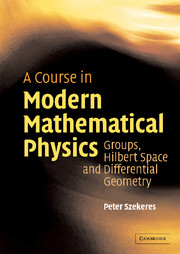Book contents
- Frontmatter
- Contents
- Preface
- Acknowledgements
- Dedication
- 1 Sets and structures
- 2 Groups
- 3 Vector spaces
- 4 Linear operators and matrices
- 5 Inner product spaces
- 6 Algebras
- 7 Tensors
- 8 Exterior algebra
- 9 Special relativity
- 10 Topology
- 11 Measure theory and integration
- 12 Distributions
- 13 Hilbert spaces
- 14 Quantum mechanics
- 15 Differential geometry
- 16 Differentiable forms
- 17 Integration on manifolds
- 18 Connections and curvature
- 19 Lie groups and Lie algebras
- Bibliography
- Index
2 - Groups
Published online by Cambridge University Press: 05 September 2012
- Frontmatter
- Contents
- Preface
- Acknowledgements
- Dedication
- 1 Sets and structures
- 2 Groups
- 3 Vector spaces
- 4 Linear operators and matrices
- 5 Inner product spaces
- 6 Algebras
- 7 Tensors
- 8 Exterior algebra
- 9 Special relativity
- 10 Topology
- 11 Measure theory and integration
- 12 Distributions
- 13 Hilbert spaces
- 14 Quantum mechanics
- 15 Differential geometry
- 16 Differentiable forms
- 17 Integration on manifolds
- 18 Connections and curvature
- 19 Lie groups and Lie algebras
- Bibliography
- Index
Summary
The cornerstone of modern algebra is the concept of a group. Groups are one of the simplest algebraic structures to possess a rich and interesting theory, and they are found embedded in almost all algebraic structures that occur in mathematics [1–3]. Furthermore, they are important for our understanding of some fundamental notions in mathematical physics, particularly those relating to symmetries [4].
The concept of a group has its origins in the work of Evariste Galois (1811–1832) and Niels Henrik Abel (1802–1829) on the solution of algebraic equations by radicals. The latter mathematician is honoured with the name of a special class of groups, known as abelian, which satisfy the commutative law. In more recent times, Emmy Noether (1888–1935) discovered that every group of symmetries of a set of equations arising from an action principle gives rise to conserved quantities. For example, energy, momentum and angular momentum arise from the symmetries of time translations, spatial translations and rotations, respectively. In elementary particle physics there are further conservation laws related to exotic groups such as SU(3), and their understanding has led to the discovery of new particles. This chapter presents the fundamental ideas of group theory and some examples of how they arise in physical contexts.
Elements of group theory
A group is a set G together with a law of composition that assigns to any pair of elements g, h ∈ G an element gh ∈ G, called their product, satisfying the following three conditions:
(Gp1) The associative law holds: g(hk) = (gh)k, for all g, h, k ∈ G.
- Type
- Chapter
- Information
- A Course in Modern Mathematical PhysicsGroups, Hilbert Space and Differential Geometry, pp. 27 - 58Publisher: Cambridge University PressPrint publication year: 2004
- 1
- Cited by

